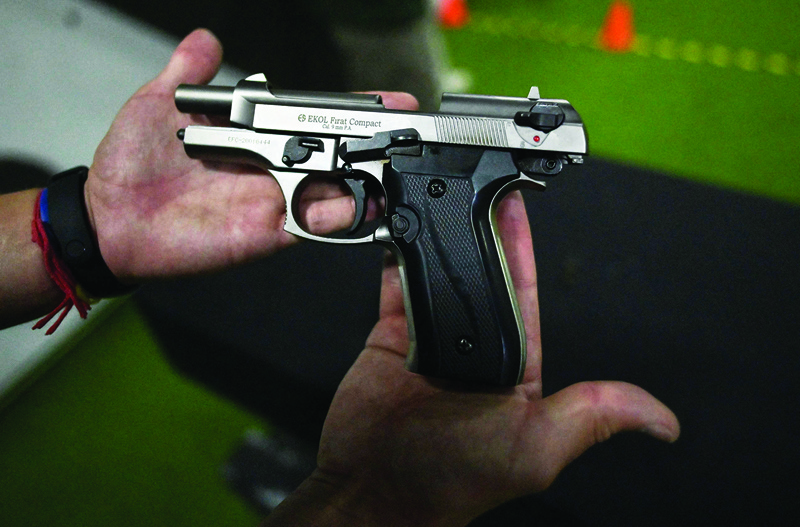 BOGOTA: View of a non lethal gun during test at a shooting range in Bogota. - AFP
BOGOTA: View of a non lethal gun during test at a shooting range in Bogota. - AFP
BOGOTA: One can buy them on street corners, legally, for the price of a toy - so-called non-lethal guns that nevertheless maim, and which proliferate in Colombia's crime-plagued cities. Imitation guns are sought after by criminals and citizens alike, for attack and self-defense - a symptom, observers say, of creeping lawlessness in a country still traumatized by decades of civil war. The guns' "impact on public security is lethal," Colombian security expert Orlando Carillo said. According to the FIP peace-building think tank, some 1.6 million imitation guns have been sold in Colombia in the 12 years since imports were legalized.
They look like the real thing and shoot projectiles from a 9 mm or 7.65 mm cartridge. The only real difference is that the bullets are rubber. Still, up to a distance of 15 meters, a rubber bullet "can cause serious injuries to a bone or muscle. To the soft parts (of the body), like an eye or an artery, an impact can be deadly," said Carillo. Originally designed as sports guns, for target-shooting, the guns are imported from China and Turkey, and sold everywhere from malls to supermarkets, on the street or the internet.
Store windows in Bogota display veritable caches of Glock, Storm Beretta, CZ or Heckler & Koch replicas that even police and other expert gun-handlers can mistake for the real thing. The most popular product on the market is the Blow Tr92 Beretta, a convincing copy of its real, Italian-made counterpart. "It is very easy. You just need the money and an ID document," says one sales advert. The guns sell for the equivalent of about $130 to $400 - a fraction of the cost of the real deal, about $2,000 for a Glock.
'Out of control'
"We find ourselves in a situation that is out of control," said the owner of a shooting club in Bogota, a former policeman who did not want to give his name. "We have made it possible for criminals to arm themselves with guns that are almost the same as the real thing, with no regulation... and at a price that defies competition!" he said.
According to the FIP, imitation gun sales have shot up from about 8,500 in 2009 to more than 190,000 last year - not counting those sold on the black market. They were mostly handguns, but also some automatic rifle replicas, adding to an estimated 4.2 million illegal guns - real ones - already in circulation. Some imitation gun owners replace the rubber bullets with lead or steel projectiles. Faced with a growing problem, the government is working on a law to regulate a sector that has flourished as violent personal and property crime has sky-rocketed.
Official data for the capital Bogota shows the number of robberies increasing by 22.8 percent this year from 2020 and murders by 15.3 percent. A robbery takes place every five minutes in Bogota, with similarly high rates in Cali, Barranquilla, and Medellin. Nearly 1,500 soldiers were recently deployed to Colombia's main cities to assist the police in crime prevention. According to the Bogota city council, imitation guns are "increasingly used to commit crimes" though there are no statistics.
Too little, too late
Last year, Luis Rodriguez Mojica, 35, lost an eye in an attack in a Bogota suburb by assailants wielding an imitation gun. "On August 23, I was going home around 10 pm," he said. "Two men on motorcycles arrived. 'Shoot him, he is going to get away' one of them shouted... My cornea was shredded by the impact." Colombia is experiencing its most violent period since a 2016 peace deal officially ended a near six-decade civil war.
Drug traffickers and dissident guerillas who reject the pact continue fighting for territorial control, with civilians often caught in the cross fire. In a bid to address one prong of the spiraling crime problem, the government's draft law will reportedly require a permit to own and to carry an imitation gun, as well as official registration and stricter sales requirements. But observers say this will not impact the large number of imitation guns already in circulation, and will likely boost their black-market sale. "It is too late," said Carillo of the government initiative. "The only option now is prohibition." - AFP




